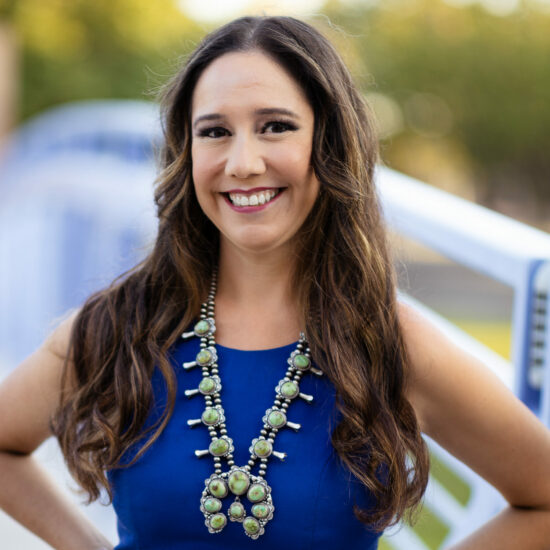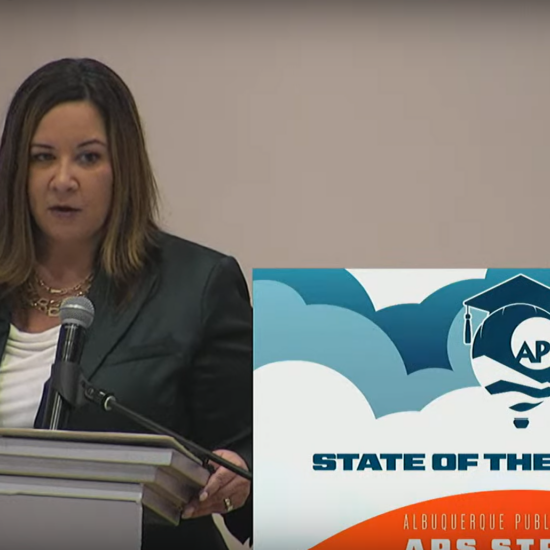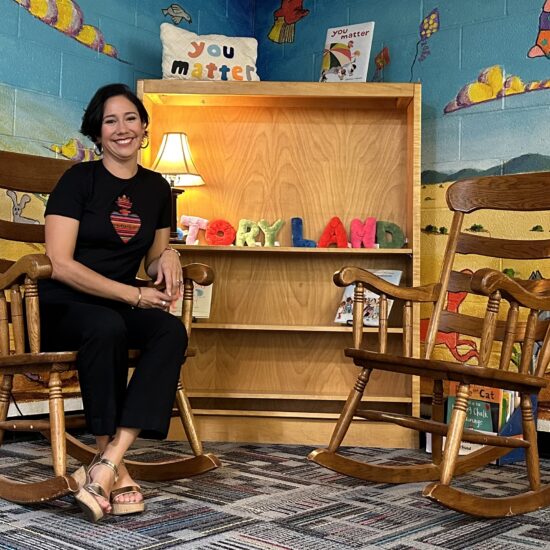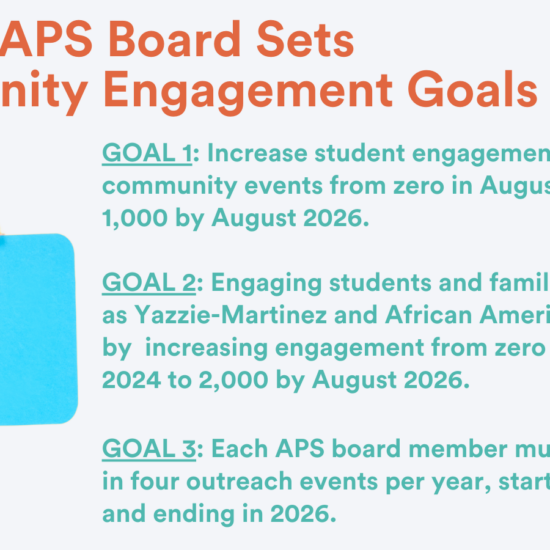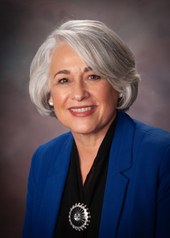
Editor’s note: Yolanda Montoya-Cordova was appointed to the Albuquerque Public Schools Board of Education in 2017, to fill a vacancy. She was elected to a four-year term in 2019, representing District 1, which encompasses parts of downtown and the South Valley . She was unanimously appointed board president by her board colleagues in January. She grew up in the South Valley and lives there currently. Both of her parents worked for APS, and she graduated from Rio Grande High School. For her day-job, Montoya-Cordova serves as deputy secretary of the state Department of Workforce Solutions. This interview, conducted March 16, has been edited for length and clarity.
New Mexico Education: Please tell us a bit about your background, and what made you want to serve on the APS board.
Montoya-Cordova: I’m a social worker by trade, so I’ve always been one who believes that you should be part of the solution and not just look from the outside in and complain about things. I represent the district where I grew up. I moved away from Albuquerque for a short time. When I came back, I moved back into this community, the South Valley, knowing it was always a difficult community. It has always been considered the community that was marginalized, struggling, challenged.
Both my parents went to Albuquerque High and made it through to at least 11th grade. When I was young they were both studying for their GEDs.They always had this place for us to study in the house. We came home from school and we sat at the dining room table and we studied with them. While they were doing their homework, we were doing ours as well. They just really pushed it on us. When I was 10, in fifth grade, my parents got their diplomas. I remember watching that. It has left an indelible mark on my heart.
Despite all those good things I remember growing up there, I also remember as a young kid being made to feel like the best option for me would be to go to college and leave that community. I did terribly on standardized tests, and probably would have been considered somebody who maybe should not have considered college. But I did and I pushed through that. I went to the University of New Mexico, and I remember just carrying with me this feeling that I’m from the South Valley and somehow it wasn’t a good feeling. When I got to college I needed remediation courses because of some of the pieces I missed in my education.
When I came back to New Mexico, I went to work for the Department of Health as the Director of School Health, so I had an indirect relationship with schools. We were overseeing at that time school nurses and school based health centers, school mental health, suicide prevention, and youth engagement activities around public health. And it was through that work that I became really invested in public education and the possibilities of what it could be.
NME: There are four new members on the APS board, and you are the newly-elected president. How do you navigate all of those challenges?
Montoya-Cordova: I know that as veteran board members three of us have an important role to play around orientation. When I came in as a new board member I really relied on the expertise and the knowledge of my fellow board members to help shepherd me through that process. I knew I would play a role in that process this time. I’m one of the veteran board members and so I have a sense of responsibility because I want us to be a high functioning board.
Having been a member of other boards, I know the significance of functioning well as a body. If we’re not functional and we can’t work well together and we can’t communicate well with each other, that’s going to bleed into everything that we do. So there is a desire on my part to have a board that can work well together, that can have honest conversations, that can sit together, learn from one another, really compromise with each other and debate issues in a good way that helps us come to consensus and to center on the things that we want to do and need to do.
On being selected for the presidency, that came as quite a surprise. I had been thinking all along that my job as deputy secretary is pretty demanding and carries a lot of responsibility. I wasn’t sure I could dedicate the time and energy that the board presidency deserves. If I was going to do it, I wanted to be able to come in and know that I could do it well. After a lot of soul searching, I did reach out to some board presidents from other school districts that I know pretty well, and said OK, I will commit to this.
But I made it very clear that I would do it on a transitional basis, for one year only, as we bring on our four new members and help around the orientation, keeping the balls in the air and guiding our ship. I told my colleagues that even if I was put forward for another year, I would decline. So I see my role as coming in and brokering between the veteran side and the new side and helping us to get through this first year of putting our processes in place.
NME: Much has been made about this new board, with a change in philosophical orientation and a potential for some tension or conflict. How do you view that?
Montoya-Cordova: I felt like that was what we were going to have when we initially started, because we didn’t know each other very well. But as I come to know the women on the board [all seven APS board members are women], and especially our new members, I see a lot of areas that we all have in common. And one piece that we all share in common is this fervor and passion around wanting to do what’s right for our students. We all believe in that. And what I really enjoy about the new members is those new eyes on issues.
I think it’s important for our constituents to see that we can work together, that we can solve problems, that we can politely disagree, and we can still come to center and say this is how we’re going to move forward and this is how we’re going to communicate it. Because if we can’t do that, then it just creates a lot of dissension amongst everyone. I’m not in disagreement at all with any of our new board members, I think our perspectives on some issues might be a little bit different, but I don’t think that they’re wildly different at all.
NME: What are your goals over the next year, when you’ll be the board president?
Montoya-Cordova: We definitely need to get our legs under us in terms of a post-pandemic perspective. I’m really hoping we don’t have another surge. We need to be ready for that if we do, but I’m praying like all get-out that we don’t, because I don’t want our schools to be disrupted anymore. That’s at the top of my list.
Second is making sure that we can sustain our teaching force. We need to truly listen to them and understand the struggles that they’ve been through these last couple of years as a workforce. And if we don’t pay attention to that it’s going to put us at greater risk. I would love to start the school year with no substitutes. I want APS to have a full-time teacher in every classroom. I want every kid to be healthy. If we can maintain health and safety and sustain our workforce, the education itself, the academics, are going to take care of themselves.
NME: What other challenges do you see? Declining enrollment is likely to have a significant impact on the district’s budget.
Montoya-Cordova: This is going to be my fifth or sixth budget round with the district. And I have not been through a budget process that has not included a deficit.The reality in public schools is that there is going to be a deficit. And so it’s this juggling act of how do we make it work with what we have?
What I’ve learned is that the darn budget has always been a concern, and not an excuse, because what I have seen is that the district will rise above it, no matter what we can rise above that, get past the budget discussion. But it’s hard because we are making decisions about what we’re going to keep, what we’re not. And then there’s the shuffle of teachers because some schools lost enrollment, others have not. It’s very, very disruptive.
NME: What about academic challenges in the district?
Montoya-Cordova: It can be frustrating, in terms of what we do to measure academics. It always seems to elude us. There has not been a magic bullet anywhere. We know that there are disparities and gaps. We also know that the ways that we measure them are not always great. My own personal experience of doing badly on standardized tests is something I keep in mind. I see that still happening with some of our kids as well where their lived experience is not necessarily preparing them for tests or for college.
We miss a lot of what we really are doing well by just looking at these standardized tests and I think we need to do a better job of talking about what these tests are telling us but we also need to pay attention to those disparity gaps.
NME: And what do you see the district doing well? What makes you proud of APS?
Montoya-Cordova: The program that always makes me this beam is our bilingual seal program where students have the opportunity to earn a seal on their diploma showing that they are bilingual. The program is incredible. And the talent that these students display as a result of that is phenomenal.
I’m particularly proud as well of the commitment of the staff, whether it’s at central office or at the schools. Every time I visit a school it’s palpable how committed they are to being part of that community. They really see themselves as leaders for the community and they really understand and can explain the significance of their role as that public school in that community. I just fall in love every time I go to a school and I hear that and see that.
I’m also extremely proud of the work that we’re doing around community schools. The fact that this has grown to 53 schools in the district is phenomenal. Those schools are really focusing on the importance of the school as an anchor for that community to create and to be a conduit for access to services and supports of various kinds.



